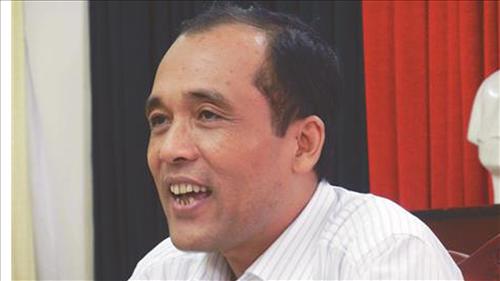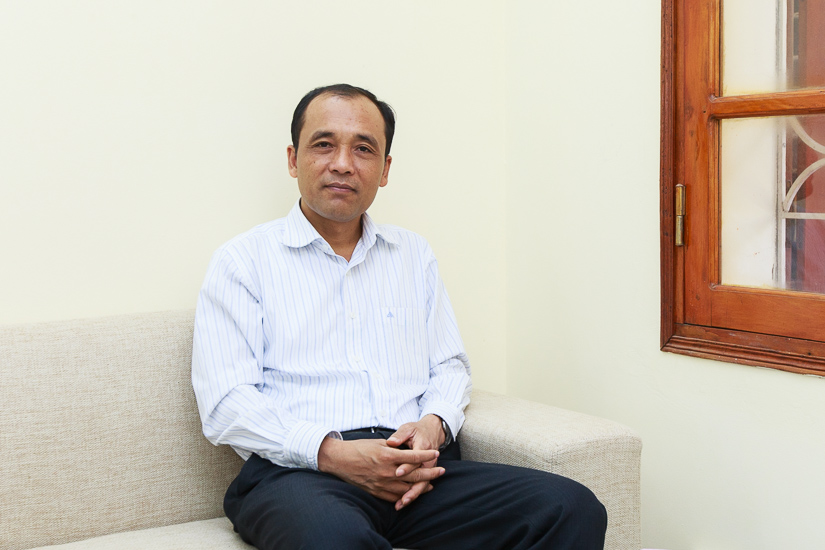
- How do you assess Vietnam's reaction and the attitude of international public opinion towards China's violation of Vietnam's territorial sovereignty?
Vietnam's response has demonstrated its unwavering commitment to the age-old, immutable principles of the Vietnamese nation: independence, sovereignty, and territorial integrity. From the actions of every ordinary citizen to the statements of the country's leaders, all have been consistent with this attitude. Our practical responses also simultaneously demonstrate our goodwill towards peace in the face of China's aggression.
The global public, both nationally, through non-governmental organizations, and individuals, has expressed deep concern over China's actions and strong support for Vietnam. All countries recognize the absurdity of China's nine-dash line claims, or more precisely, its scheme to monopolize the South China Sea. However, if this scheme is realized, to any extent, it will harm the security of the entire region and the world. China's deployment of the Haiyang 981 oil rig violates Vietnam's sovereignty, but it also confronts the reality that this threat is real and imminent for countries in the region and those involved.
China's actions have infringed upon the territorial sovereignty of a nation, seriously violating international law. On the other hand, the international community's recognition of Vietnam's sovereignty over the Hoang Sa and Truong Sa archipelagos, evidenced by historical documents and facts prior to China's forceful occupation in 1974, is increasingly widespread. It should also be noted that we need to be more proactive and effective in presenting to the world the irrefutable historical and legal evidence of Vietnam's sovereignty over the Hoang Sa and Truong Sa archipelagos. In short, in any case, reason and morality will always prevail.

Assoc. Prof. Dr. Vu Van Quan (Head of the Department of History, Faculty of Social Sciences and Humanities, Vietnam National University, Hanoi). (Photo: Thanh Long/USSH)
- Following this event, what are your thoughts on the role and contributions of researchers in general, and researchers from Vietnam National University, Hanoi in particular, to affirming Vietnam's sovereignty over its maritime territories and islands?
Faced with major issues, especially those concerning the survival, development, or decline of the nation, every Vietnamese person, depending on their position, has a responsibility. Among these, intellectuals always play a significant role. Specifically regarding Vietnam's sovereignty over the Hoang Sa and Truong Sa archipelagos and the sea and islands in general, clarifying the history of our ancestors' establishment and exercise of sovereignty over these archipelagos is extremely important. In this case, researchers in general, especially historians, have made very positive contributions.
We know that after China used force to occupy the Paracel Islands in early 1974, a year later, the Historical and Geographical Journal published in Saigon released a special issue on the Paracel Islands, bringing together Vietnamese intellectuals both inside and outside the country to collect documents, research, and analyze in order to affirm the historical and legal basis of Vietnam's sovereignty over the Paracel and Spratly Islands. It should also be added that these initial research results are extremely important suggestions for studying Vietnam's sovereignty over the Paracel and Spratly Islands from a historical and legal perspective.
In the early 1990s, a large-scale, comprehensive state program on the East Sea and islands was launched, including scientific research activities. Hanoi National University (then Hanoi University) actively participated in this program. I remember that the research project code for Hanoi University was BD-HD.01, led by Professor Dang Ung Van, researching geographical, historical, and legal issues (with the historical research branch being called ""The history of Vietnam's sovereignty over the Hoang Sa and Truong Sa archipelagos"(with code number BD-HD 01-01, chaired by Prof. Dr. Nguyen Quang Ngoc). It was the staff of Hanoi National University who diligently searched from Sa Ky port to Ly Son island for evidence of the Hoang Sa fleet's activities, meticulously examining Nguyen Dynasty archives to find documents reflecting the Nguyen Dynasty's exercise of sovereignty over Hoang Sa… Initial collections of documents on Vietnam's sovereignty over Hoang Sa and Truong Sa have been built (ancient texts, maps, and field documents from Vietnam affirming Vietnam's sovereignty over the Hoang Sa and Truong Sa archipelagos; Western documents, especially maps, directly or indirectly reflecting Vietnam's sovereignty over the Hoang Sa and Truong Sa archipelagos; and particularly documents from China itself denying or not reflecting their sovereignty over these archipelagos…). To date, our collected documents are quite substantial and will continue to grow even more substantial. These findings provide an important basis for scientists at Hanoi National University to contribute their voices as the South China Sea issue heats up.
Currently, in light of the demands of the new situation, as a leading multidisciplinary university in the country, Vietnam National University, Hanoi, needs to demonstrate its potential and responsibility regarding the East Sea issue. In fact, in recent days, since China began its actions violating Vietnam's sovereignty, on all forums, scientists from Vietnam National University, Hanoi, have been very active, especially in proving the historical and legal basis of Vietnam's sovereignty over its islands and seas based on international law, clearly exposing the wrongdoings and disregard for law and morality on the part of China.
The leadership of Vietnam National University, Hanoi has also issued timely and specific directives on this matter. Vietnam National University, Hanoi will certainly actively participate in building a dossier on maritime and island issues, especially historical documents on Vietnam's sovereignty, the legal basis of that sovereignty based on international law, and most importantly, bringing these documents to the world, to governments, organizations, individuals, and especially academics, to make the world aware of the truth.
- This event also serves as a wake-up call about the need to build stronger national capabilities when the threat of foreign invasion is imminent. What are your thoughts on this comment?
The internal strength of a nation must be understood to include both material and spiritual strength. Historical experience in resisting foreign invasion shows that we only achieve victory when we possess a combination of both sources of strength.
That spiritual strength is patriotism, crystallized from love for one's homeland; love for one's fellow countrymen with the spirit of "people of the same nation must love each other"; pride in the glorious history and national culture, which Nguyen Trai summarized as early as the 15th century: "As for our Great Viet nation from the beginning; it has long been known for its civilization"; the spirit of national independence - the ultimate goal and sacred duty of every generation of Vietnamese people; a profound awareness of national sovereignty and a resolute determination to firmly defend that sovereignty with the spirit of "Sacrifice for the Fatherland, determined to live"; national self-respect and pride... That tradition, that ideology, has been formed over thousands of years of history, over thousands of years under foreign domination, over a dozen major and minor wars of national defense, forged into a precious spiritual product, passed down from generation to generation.
But spiritual strength alone is not enough; we must harness that strength in building and developing material power. Patriotism must be "activated" to transform into a driving force for development, building a powerful Vietnam with sufficient material and spiritual strength to firmly protect national independence, sovereignty, and territorial integrity.
- As a researcher and lecturer on Vietnamese history, what can you summarize about the lessons our ancestors learned in defending the country?
I have stated before that Vietnam has a strategic location in many respects, bordering a powerful neighbor with expansionist ambitions. Therefore, from the very dawn of our nation, we have faced foreign pressure. Historical reality shows that no other nation in the world has had to wage as many wars against foreign invaders as Vietnam, even constantly confronting the most powerful forces. We have ultimately achieved victory, but not without defeats: the defeat in the resistance against Nam Viet led by Trieu Da in 179 BC, the defeat of Ho Quy Ly and the Ho Dynasty in the resistance against the Ming in the early 15th century, and the defeat of the Nguyen Dynasty in the resistance against the French in the late 19th century.
Failures have many causes and leave profound historical lessons: An Dương Vương failed because of a lack of vigilance, Hồ Quý Ly because of a loss of popular support, the Nguyễn dynasty suffered from a depleted country and weak, cowardly rulers and officials… Therefore, the lesson here is very simple: we must always be vigilant, united from top to bottom, the country must be strong, and when the homeland is invaded, from the king and officials to the common people, everyone must be determined to fight to the end for independence, sovereignty, and territorial integrity.
These lessons are being put into practice more powerfully than ever before.
- Personally, how do you think Vietnam and its people will overcome this difficulty?
First and foremost, we must firmly believe that patriotism and unity are traditional spiritual values of the Vietnamese people, refined over thousands of years of building and defending the nation. And always, whenever the nation is in danger, the spirit of patriotism and unity will rise and flourish. But it will only rise most strongly and flourish to its fullest extent if there is unity from top to bottom.
It is true that we are facing many difficulties and challenges, but in the history of Vietnam and in the nearly 70 years of the new Vietnam, the country has faced even more serious difficulties and challenges, and we have overcome them all. History shows that overcoming all difficulties and challenges requires the steadfastness and wisdom of those responsible for the destiny of the country, and this can only be achieved on the foundation of the unity and determination of the entire nation, the unity of will of the entire people. The recent incident of China violating Vietnam's sovereignty is also a "test" of the patriotism and solidarity of the Vietnamese people. Everything that Vietnamese people, both at home and abroad, have demonstrated through their attitudes and actions in recent days has shown the whole world that, for the Vietnamese people, national territorial sovereignty is absolutely sacred, and every Vietnamese person will do everything possible to protect that sacred sovereignty.
Thank you very much, sir.
Author:Thanh Ha
Newer news
Older news